Posted October 27, 2023 by Nicky in Reviews / 2 Comments
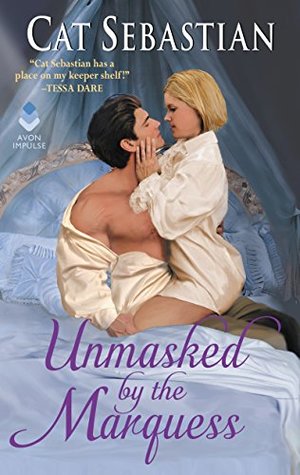
Unmasked by the Marquess
Genres: Historical Fiction,
Romance Pages: 320
Series: Regency Imposters #1 Rating: 
Synopsis: Robert Selby is determined to see his sister make an advantageous match. But he has two problems: the Selbys have no connections or money and Robert is really a housemaid named Charity Church. She's enjoyed every minute of her masquerade over the past six years, but she knows her pretense is nearing an end. Charity needs to see her beloved friend married well and then Robert Selby will disappear... forever.
Alistair, Marquess of Pembroke, has spent years repairing the estate ruined by his wastrel father, and nothing is more important than protecting his fortune and name. He shouldn't be so beguiled by the charming young man who shows up on his doorstep asking for favors. And he certainly shouldn't be thinking of all the disreputable things he'd like to do to the impertinent scamp.
When Charity's true nature is revealed, Alistair knows he can't marry a scandalous woman in breeches, and Charity isn't about to lace herself into a corset and play a respectable miss. Can these stubborn souls learn to sacrifice what they've always wanted for a love that is more than they could have imagined?
Unmasked by the Marquess is a m/nb romance, which may not be entirely apparent to all readers since Sebastian chooses to refer to Robin as she/her (a fact which is addressed in the author’s note, in a way that makes sense to me). It’s also a little bit grumpy/sunshine, if that’s something that appeals to you.
I did find myself struggling a bit in the middle of the book with the two of them being all “our relationship can never be, alas, woe, alack!” I mean, it makes sense, there needs to be something keeping them apart… but it felt a bit repetitive and like it wasn’t moving forward quite quickly enough.
I do enjoy both the characters, but especially Robin; I love that she’s so clever (and that sometimes she can’t resist going off into a dissertation on a pet subject), and I enjoy the ease she brings to Alistair: watching him open up as character was pretty fun.
Rating: 3/5
Tags: book reviews, books, Cat Sebastian, historical fiction, romance
Posted March 6, 2023 by Nicky in Reviews / 0 Comments
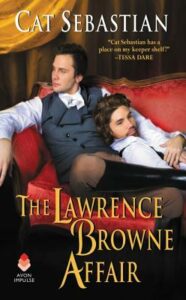 The Lawrence Browne Affair, Cat Sebastian
The Lawrence Browne Affair, Cat Sebastian
The Lawrence Browne Affair features a side character from the first book: none other than Georgie Turner, conman and thief extraordinaire. I wasn’t a huge fan of his character from his portrayal in the first book, but I’ve thought that before with Sebastian’s books, and she made it work once we’re in close-third POV and can see Georgie’s thoughts and understand his damage.
Once again, she surprised me with the way the plot worked out. The easy and obvious conflict was not what happened, and the characters trusted each other and the bond they were forming, in a way that often doesn’t happen in romance novels (and presumably real life, but I don’t enjoy it there either). Okay, people didn’t quite manage to communicate properly and talk out their problems — but at least they avoided throwing away all the evidence they’d seen with their own eyes, and avoided just believing the worst of each other instantly. Even though it would, in fact, be all of a piece with their pasts. (I’m trying to be a little vague here.)
It’s sort of a Beauty and the Beast story, which amused me too, and I enjoyed the way Georgie came to realise that he actually liked a lot of his marks — it’s what made him a good conman, and also a part of why he was so unhappy as a conman.
Overall, a sweet book and one I enjoyed. I loved Lawrence finding himself.
Rating: 4/5
Tags: book reviews, books, Cat Sebastian, historical fiction, queer fic, romance
Posted January 30, 2023 by Nicky in Reviews / 0 Comments
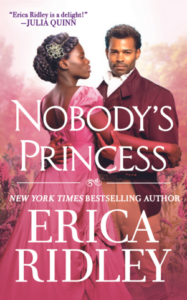 Nobody’s Princess, Erica Ridley
Nobody’s Princess, Erica Ridley
Nobody’s Princess gives Graham Wynchester a chance to really shine — something I’d been looking forward to for quite a while after his appearances in The Duke Heist and The Perks of Loving a Wallflower. Here he’s centre stage, romantic hero, and he finally has a chance to rescue a real princess (sort of).
Kunigunde is a visitor from the very kingdom the Wynchesters’ adoptive father Bean came from, and she’s on a mission to become a Royal Guardswoman, the very first. Her brothers have different ideas, and are trying pretty hard to chase her down, but Graham’s at hand to involve himself (whether she likes it or not) and save the day (whether or not she’d have come up with something for herself).
It was nice to see Graham front and centre, and maybe it’d just been a little while since I read the other books, but I was surprised by how silly he was at times. Not that I really should have been, given the Wynchesters’ banter amongst themselves — but I did have a touch of embarrassment squick about his quixotic attempts to be Kuni’s knight in shining armour.
I did love the way Kuni found herself falling in love with not just Graham, but the whole life of the Wynchester family. I wasn’t sure about how things were going to get figured out, but I found the end pretty satisfactory.
I didn’t love this as much as the first two books, and I had a bit of concern about the way Kuni was portrayed (in particular, the kind of language mistakes she made, which didn’t at all seem to fit with her proficiency with the language or my experience of people who speak English as a second language — I’m married to one, so you could say I’ve done extensive research on the subject). That said, I absolutely inhaled the book, and I had a lot of fun.
Rating: 3/5
Tags: book reviews, books, Erica Ridley, historical fiction, romance
Posted January 29, 2023 by Nicky in Reviews / 2 Comments
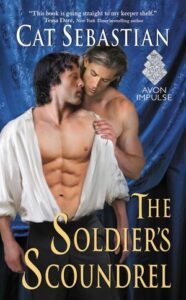 The Soldier’s Scoundrel, Cat Sebastian
The Soldier’s Scoundrel, Cat Sebastian
Jack Turner is sort of a private detective, sort of an agent of poetic justice, handling messes that higher-class society folks want sweeping under the rug — an abusive husband, a case of blackmail, stolen items… He clashes with Oliver Rivington, a soldier in need of lawful stability after the war, after helping Oliver’s sister out with such a problem, and I honestly expected sparks to fly much more than they did. It’s such an easy source of conflict for a romantic relationship: their morals differ so much! They’re opposed on a fundamental level!
And indeed, it is part of the conflict — but part of the joy of the book is in fact that Oliver considers his errors, reconsiders his position, and unbends enough to listen to Jack’s point of view. It’s not his way or the highway; even when he briefly thinks it might has to be, he’s still open to communication.
Is their burgeoning relationship a heaven of perfect communication, the meeting of like minds? Nope. Oliver still balks at some of Jack’s opinions and methods, and Jack for his part has a lifetime of trauma that shapes how he sees Oliver’s thoughts and actions. Each has to bend a little, and make efforts, to make the thing work, but it all feels more gentle and more intimate because Oliver is prepared to bend, prepared to apologise, prepared to live at Jack’s level. I cared about their relationship all the more because the conflict wasn’t straight-forward, because Oliver wasn’t prepared to let it go too easily, and wasn’t too proud to apologise — and Jack wasn’t too proud to accept it.
Overall, I found this really enjoyable. Jack’s approach to justice isn’t mine, but it makes sense for his life, and Oliver’s acceptance of it makes sense as well, and their relationship genuinely feels built on more than just headlong attraction between two stubborn assholes who won’t talk to each other — which can be lacking in other romances, where I wonder how on earth they’ll get on in the long run given they spent a whole book refusing to bend only to have a dramatic rapprochement at the end.
Rating: 4/5
Tags: book reviews, books, Cat Sebastian, historical fiction, queer fiction, romance
Posted May 26, 2022 by Nicky in Reviews / 0 Comments
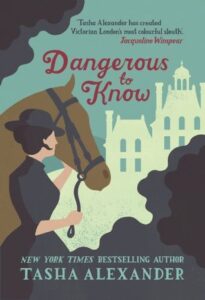 Dangerous to Know, Tasha Alexander
Dangerous to Know, Tasha Alexander
Dangerous to Know really disappointed me: I picked it up and was finding it really enjoyable, having given the Lady Emily series a bit of a break. However, part of why I love the series is Emily’s independence and free thinking, and Colin’s efforts to stifle her feel out of character in their suddenness (he’s been protective before, several times, but not in the sense of flat-out saying “I’m your husband now and you’ll do as I say”).
It was nice to meet Colin’s mother (who wouldn’t approve at all of what he’s doing, I’ll add), and to have Cécile around for much of the story, and I was happy for the return of Sebastian Capet, of course. The cast and mystery remained pretty much what I would expect… it’s just Colin who was disappointing.
I’m giving him one more book to behave himself, since I own the next book, but if he really hasn’t learned his lesson, then I’m moving on from this series. I’m not looking for realism here, at least not to that extent.
Rating: 3/5
Tags: book reviews, books, historical fiction, mystery, romance, Tasha Alexander
Posted May 8, 2022 by Nicky in Reviews / 0 Comments
 The Sugared Game, K.J. Charles
The Sugared Game, K.J. Charles
The problem I have with Will and Kim is that I want to scream at them to communicate properly, but the fact that they have difficulty with that is relevant to the plot, and thus you can’t be too mad at them because it totally makes sense… but also, stop hurting each other for stupid reasons (mostly looking at you, Kim) and figure yourselves out.
It seems like the end of this book puts them in a place where that’s somewhat more possible, which I’m glad about — and the ride to get there is one hell of a thing. I can’t talk about it too much: just as Kim can’t tell Will much at all without revealing way too much, I think to say too much here would spoil the plot a little.
The climax of the book is pretty hair-raising and dramatic (in a way that works perfectly). It leaves me wondering where they’ll go next… and eager to find out. I wonder what fresh complications they’ll manage to throw in each others’ way, how they’ll cope with Zodiac now, and whether Phoebe and Maisie will be part of it (and what part they’ll play, exactly).
I didn’t spot the cameo until I saw a review mentioning it, which just proves it’s been too long since I read some of Charles’ books. Clearly I’ll have to fix that with some rereading.
Rating: 4/5
Tags: book reviews, books, historical fiction, K.J. Charles, mystery, romance
Posted December 21, 2021 by Nicky in Reviews / 0 Comments
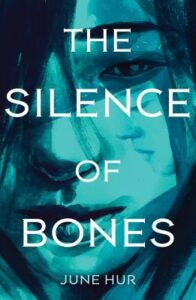 The Silence of Bones, June Hur
The Silence of Bones, June Hur
This one is a little out of the beaten path for me: it’s a mystery, but set in a historical place and period I know nothing about, set in Joseon, Korea, in the 1800s. I found the setting and role of the main character pretty fascinating: Seol is a damo, a female indentured assistant to the police, who can handle female corpses and search women’s rooms with propriety, giving them information to assist their cases. Seol is a curious girl, with a secret mission of her own to seek out her older brother, who long ago left for the city.
There are some turns of the story that I found very predictable, which I shouldn’t say anything at all about for fear of immediately spoiling the mystery for someone! I didn’t notice the person I should be suspecting, though, so the central mystery did hold up. There are some quite graphic descriptions of violence, gore, torture and dead bodies, but all described in a rather matter-of-fact way, so it didn’t make me too squeamish.
I thought I hadn’t really got attached to the characters, finding Seol a bit annoying in her impulsiveness and inability to think things through all the way to the end, but the ending did actually come through for me. I think the setting was probably the thing that interested me most going in, and that held up for sure: I’d be interested to read more about it, non-fiction in particular!
I’m finding it a bit difficult to settle on a rating, as I don’t feel very passionate about it one way or another: it was enjoyable and made me curious, but not something I couldn’t put down.
Rating: 3/5
Tags: book reviews, books, crime, historical fiction, June Hur, mystery
Posted November 28, 2021 by Nicky in Reviews / 0 Comments
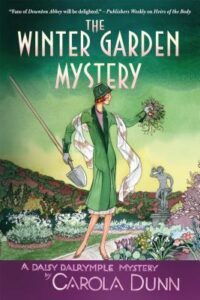 The Winter Garden Mystery, Carola Dunn
The Winter Garden Mystery, Carola Dunn
I started this right after Death at Wentwater Court, since I was in the mood for a bit more time spent with Daisy. In this one, she calls in Alec to help when the local police wrongfully (in her view) accuse someone of murder. She’s present at the discovery of the victim, and quickly forms her own opinions about who did it — or at least, in typical Daisy-fashion, who didn’t.
I enjoy this one a lot. There are a number of supporting characters that feel like friends very quickly (Ben Goodman, Bobbie Parslow), and references to rather sweet familial and romantic relationships. There are a few villains, of course, and Lady Valeria in particular is really well drawn — her overbearingness, her attitudes, her self-importance. And then there’s Alec, wholly unprofessional in his dealings with Daisy, of course, but caring for the truth and trusting in her judgement (even as he complains that others do that too much!).
The formula’s still reasonably fresh at this point, and the cast of characters enjoyable, so all in all I had fun. I loathe the attempt to render the Welsh accent phonetically, though.
Rating: 4/5
Tags: book reviews, books, Carola Dunn, crime, historical fiction, mystery
Posted November 27, 2021 by Nicky in Reviews / 0 Comments
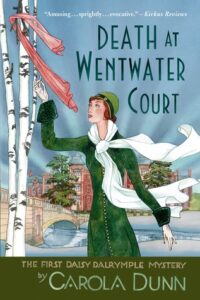 Death at Wentwater Court, Carola Dunn
Death at Wentwater Court, Carola Dunn
It’s been a while since I read any of the Daisy Dalrymple books, and I was looking for something light and easy, so I decided to start over and reread the first book. As I recall, I got pretty frustrated with the series and the way Daisy constantly stumbles over bodies… but in this book, of course, the habit hasn’t developed yet and you just get to enjoy warm, friendly, clever Daisy — and the beginnings of her friendship with Alec, of course.
In addition, Dunn makes the supporting characters appealing (for the most part, with one or two villains to be the victim and suspects, as you’d expect from a cosy mystery), and you really do want things to turn out well. Daisy really does act like a bit of an idiot at the end, thinking she’s being very clever but actually causing massive problems for poor Alec. It does work out very neatly, but that’s reliant on luck.
Still, it’s fun, and I look forward to rereading more of the series.
Rating: 3/5
Tags: book reviews, books, Carola Dunn, crime, historical fiction, mystery
Posted October 30, 2021 by Nicky in Reviews / 0 Comments
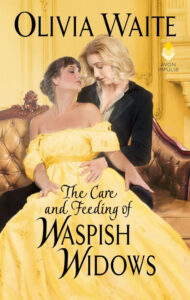 The Care and Feeding of Waspish Widows, Olivia Waite
The Care and Feeding of Waspish Widows, Olivia Waite
I picked up The Care and Feeding of Waspish Widows from where it had been patiently awaiting me on the shelf more or less on a whim… and got immediately sucked in. At first I couldn’t quite see how Agatha and Penelope were going to work — and in that sense the book was very much a slow burn and definitely put the work in! I believed in it without question by the end, for sure — and I also believed that they would be good for one another.
Agatha and Penelope are both rather independent, but each in their own way, bringing their own strengths to the partnership. Agatha is practical, focused on her goals of managing her business and her son as he comes of age-but she lacks idealism and joy. Those things aren’t lacking around Penelope, though she has yet to find her voice and her joy. From being quite unlike, you quickly come to understand why they complement each other and work well as friends — better than they might have imagined.
They are the main characters, of course, but there’s much to enjoy in the supporting cast: Penelope’s ‘husband’ and his real relationship with Penelope’s brother; the shocking and unrepentant poet, Joanna Molesey; Sidney, Agatha’s son, and Eliza, his lover… the supporting cast all have their charms and their stories, and help to bring the story to life.
Another aspect some readers will be keen on is the fact that Agatha and Penelope are mature women: Agatha has an adult son, after all! This isn’t a story of blemishless, stunning young women, but one of women who have lived, and enjoy that in one another. Pretty as the cover is, too, it’s misleading — Agatha and Penelope are average women, not higher class debutantes.
To my surprise, the book fell together for me very well, despite my initial scepticism about the characters and how they’d fit together. And their little revenge against closed-minded prigs in their community is rather enjoyable…
Rating: 4/5
Tags: book reviews, books, historical fiction, Olivia Waite, queer fic, romance











